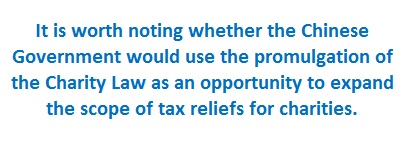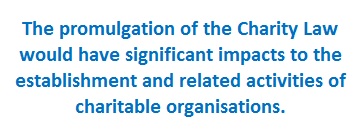Charity related tax reliefs need to be further clarified as the Charity Law comes into effect on 1st September 2016
By Kelvin Lee, PwC Tianjin
 In brief
In brief
The recently completed twelfth National People's Congress (NPC) has approved the Charity Law. As a fundamental and comprehensive piece of legislation for the charitable sector, the Charity Law has attracted a lot of attention from public during the legislating process and its related tax policies have always been a focus of discussion.
We notice that most of the tax related articles in the Charity Law only provide general principles without any detailed explanations, except for Article 76 which specifies that charitable donations that exceed the annual deductible limit are allowed to be carried forward for three years. Therefore, there are a lot of areas that the Ministry of Finance (MOF) and the State Administration of Taxation (SAT) need to work on, such as detailed implementation procedures for each tax relief, to ensure that the existing tax relief policies are implemented appropriately. In addition, it is worth noting whether the Chinese Government would use the promulgation of the Charity Law as an opportunity to expand the scope of tax reliefs for charities.
In detail
Attention paid to taxation matters during the legislating process of the Charity Law
 Charity Law is a set of comprehensive laws regulating charitable undertakings, including rights and obligations of charitable organisation, donor, and beneficiaries. The law also provides regulatory requirements for the scope of charity activities and related legal supervision.
Charity Law is a set of comprehensive laws regulating charitable undertakings, including rights and obligations of charitable organisation, donor, and beneficiaries. The law also provides regulatory requirements for the scope of charity activities and related legal supervision.
During the process of drafting the Charity Law, there were different points of view on whether or not the law should expand and explain related tax policies. One point of view is that under the general practice of China's legislation, tax related issues should be clarified in tax specific legislations and the Charity Law should not have detailed tax policies provisions. The other point of view is that tax reliefs play an important role in promoting charitable undertakings and to the extent that the issues are not well addressed in the existing tax laws, the Charity Law should provide comprehensive tax provisions. The first point of view is basically adopted in the final Charity Law.
Major tax issues relating to the Charity Law
Charitable organisation qualifications
The Charity Law sets out detailed requirements on the establishment, registration and on-going administration of charitable organisations. It has delegated the authority to the MOF and SAT to formulate standards for charitable organisations on annual expenditure for carrying out charitable activities and administration costs. Based on the current regulations, tax issues relating to the qualification of charitable organisations mainly include:
-Whether the charitable organisation fulfils the qualification criteria for non-profit making organisations stipulated in "Corporate Income Tax Law of the People's Republic of China" (CIT Law) in order to enjoy tax exemption on income. The detailed qualification criteria and assessment standard are in circular Caishui [2014] No. 13.
-Whether the charitable organisation is qualified to receive tax deductible donations, in other words, whether donations made by an enterprise or individual through this organisation would be considered to be charitable in nature and hence eligible for tax deduction (herein referred to "qualified charitable organisation"). With the "Simplified Administration and delegation of authority" reform, the pre-approval procedure for the tax deductible donation qualification has been abolished and replaced by an assessment jointly conducted by the MOF, SAT and Ministry of Civil Affairs (MCA) after verifying the status of the organisation registration and its charitable activities with a list of qualified charitable organisations published regularly. For the detail procedures, please refer to circular Caishui [2015] No. 141.
 CIT deduction for charitable donation expenditure
CIT deduction for charitable donation expenditure
According to CIT Law and "Individual Income Tax (IIT) Law of the People's Republic of China", enterprises and individuals can deduct charitable donation expenditure within a certain prescribed limit when calculating the taxable income. The prescribed deduction limit is 12% of an enterprise's total annual net profits and 30% of an individual's taxable income respectively. The portion of charitable donation expenditure which exceeds prescribed deduction limit will not be deductible. Charity Law has now stipulated that the portion of qualified charitable donation expenditure which exceeds the prescribed deduction limit can be carried forward and utilised within the following three years. This is aimed to encourage enterprise to participate more in charitable activities as it would, to a certain extent, alleviate the enterprise's concern on the deductibility of charitable donation where there is a one-off significant donation amount that exceeds the prescribed deduction limit or the enterprise is in a loss year. We believe that further implementation measures will be issued by the MoF and SAT and the CIT return will be amended accordingly.
Charitable donation from overseas
In accordance with the provisions of the "Law of the People's Republic of China on Donations for Public Welfare" and other regulations, customs duties and import value added tax would be exempted on imported goods and materials donated from overseas to domestic charitable organisations for use in charitable undertakings. According to the "Provisional Measures for the Exemption of Import Tax on Charitable Donations of Goods and Materials" which is jointly issued by the MOF, General Administration of Customs and SAT, this preferential policy only applies in the situation where the recipient of donation is the government or certain specified charitable organisations, and there are also restrictions on the scope of donated goods and materials. The Charity Law has expanded this policy to all "imported goods and materials donated from overseas for use in charitable undertakings" and abolished the qualification requirement of the recipient of the donation. However, it remains to be seen whether the existing rules would continue to be adopted in the administration of the policy.
 Scope of tax reliefs is not expanded
Scope of tax reliefs is not expanded
Other than the above, the Charity Law has not provided any clarifications on taxation matters. It only stipulates that charitable organisations, donors, and beneficiaries can enjoy tax reliefs according to relevant laws, such general provision would not have any substantial impact to the existing tax policies.
Expectations on the development of tax policies
Other than expectation on the practical implementation of taxation measures in the Charity Law, other matters have also been raised by the industry:
-According to prevailing laws and regulations, only charity donations to charitable organisation or government qualify for tax deduction in China, this tax deductible scope is narrower than that of developed countries. The Charity Law now allows donations to be made through charitable organisations or directly to beneficiaries. Therefore, it may be the time to consider amending the relevant policies to strengthen support from a legislation perspective.
-Currently donation of the non-cash asset is regarded as deemed sales and sales revenue has to be recognised, whether it is possible to issue relevant policy to provide tax relief for such donations.
-Whether the prescribed deduction limit can be increased.
Although the above issues are not considered in the Charity Law, with strengthening of China's support to charitable undertakings and increase in the tax administration capabilities, we believe that relevant authorities would continue to push this forward. However, as amendment of the laws and regulations requires a long argumentation process, we expect that it would not materialise in a short period of time.
 There are rumours that, after the promulgation of the Charity Law, the legislative authorities are considering the introduction of estate tax to match with the Charity Law in order to promote the development of charitable undertakings. Since estate tax would have a wide spread impact, previous rumours have attracted a lot of attention from the public. In practice, legislating and levying new taxes requires the approval of the NPC. Currently, estate tax is not in the legislation plan of the NPC, it would not be possible for estate tax to be legislated in the next few years.
There are rumours that, after the promulgation of the Charity Law, the legislative authorities are considering the introduction of estate tax to match with the Charity Law in order to promote the development of charitable undertakings. Since estate tax would have a wide spread impact, previous rumours have attracted a lot of attention from the public. In practice, legislating and levying new taxes requires the approval of the NPC. Currently, estate tax is not in the legislation plan of the NPC, it would not be possible for estate tax to be legislated in the next few years.
The takeaway
The promulgation of Charity Law would have significant impacts to the establishment and related activities of charitable organisations. Although taxation articles in the Charity Law have not indicated any significant changes to the existing policies, taxation issues are still matters that charitable organisations must pay attention to, including:
-Timely obtaining tax exemption qualification so as to reduce the operating costs of charitable organisation;
-Timely obtaining deductible donations qualification which will help to boost donations;
-Distinguishing the nature of income earned from different activities and accounting for them properly so as to improve tax compliance;
-Improving internal control and making reasonable plan for expenditures which would help to enhance the transparency of the organisation and its reputation as regards the public.
Besides having a direct impact to charitable organisations, the impact of Charity Law in regulating charitable activities organised by the public also deserves attention. In addition, as mentioned above, we hope the relevant government authorities would use the promulgation of the Charity Law as an opportunity to correspondingly amend relevant tax policies to provide charitable activities with more policy support and encouragement.
---END---